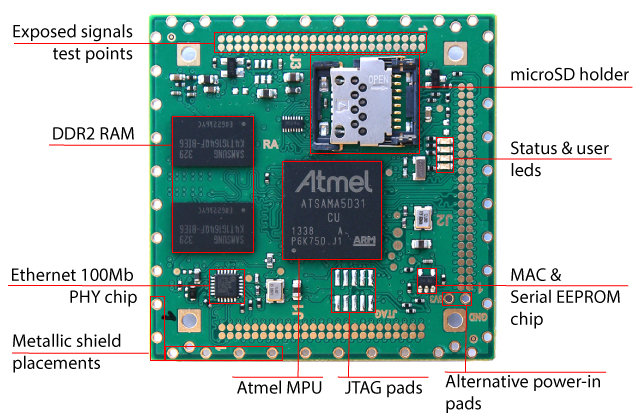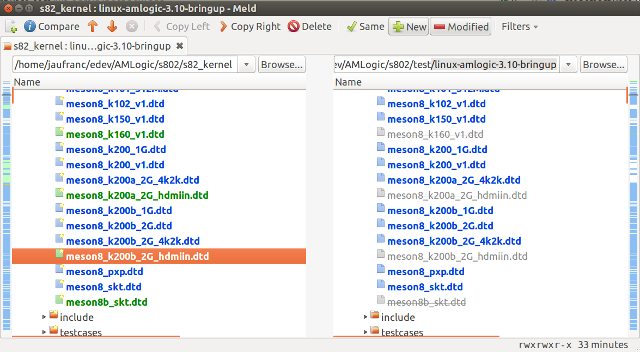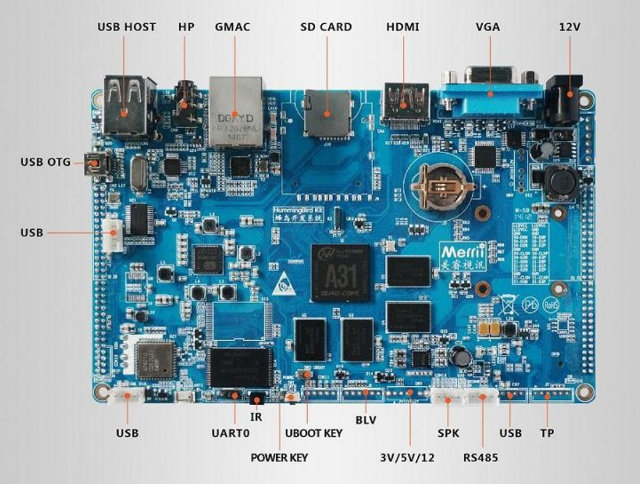Linaro 14.06 has been released last week with Linux Kernel 3.15 (baseline), Linux Kernel 3.10.44 (LSK), and Android has been updated to 4.4.3. One interesting development this month is that Android for ARMv8 (64-bit ARM) is booting on the fast models using ARM Trusted firmware and U-Boot. SELinux has been enabled in Android. I could not see much new member hardware, except possibly B2120 (HDK) reference board for STMicro STiH407 “Monaco” STB SoC. Here are the highlights of this release: Linux Linaro 3.15-2014.06 GATOR version 5.18 (same version as in 2014.04) updated basic Capri board support from Broadcom LT cortex-strings-arm64 topic (same as in 2014.02) updated Versatile Express ARM64 support (FVP Base and Foundation models, Juno) from ARM LT. updated Versatile Express patches from ARM LT more HiP0x Cortex A15 family updates from HiSilicon LT (hip04_eth, hip04_defconfig) updated LLVM topic Big endian support (same as in 2014.05) ftrace_audit topic from […]
64-bit ARM Server Motherboards by SoftIron
We’ve already seen development board such as X-Gene XC-1, and 64-bit ARM servers have been demonstrated by Dell and HP, but SoftIron, a British startup, claims to be the first to provide a production ready ARMv8 solutions for the enterprise server market (e.g. data centers), with its SoftIron 64-0400 and 64-0800 server motherboards powered by Applied Micro X-Gene quad and octa SoC. Although the company did not release complete pictures of the board, they seem to have done a better job with specifications: SoC SoftIron 64-0400 – Applied Micro X-Gene APM883204 with 4x 64-bit ARMv8 cores @ 2.4 GHz, 4x 32-bit ARMv5 cores for Network/Security offloads and Acceleration, and 1x Cortex M3 for server management SoftIron 64-0800 – Applied Micro X-Gene APM883208 with 8x 64-bit ARMv8 cores @ 2.4 GHz, 4x 32-bit ARMv5 cores for Network/Security offloads and Acceleration, and 1x Cortex M3 for server management System Memory – Up […]
Linux 3.15 Released
Linus Torvalds announced the release of Linux Kernel 3.15 last Sunday: So I ended up doing an rc8 because I was a bit worried about some last-minute dcache fixes, but it turns out that nobody seemed to even notice those. We did have other issues during the week, though, so it was just as well. The futex fixes and cleanups may stand out, but as usual there’s various other random fixes since rc8 in there too: mainly drivers (drm, networking, sound, usb etc), networking, scheduling and perf tooling. But it’s all been fairly small and quiet, which *may* of course be due to the fact that last week was also the first week of the merge window for 3.16. That might have distracted some developers. I’m not entirely convinced I liked the overlap, but it seemed to work ok, and unless people scream really loudly (“Please don’t _ever_ do that again”) and give good […]
Acme Systems Acqua A5 is a System-on-Module Powered by Atmel SAMA5D3 Processor
Acme Systems has announced availability of their Acqua A5 SoM with Atmel SAMA5D31 Cortex A5 micro-processor, up to 512 MB RAM, up to 256 MB Flash, a serial EEPROM, a micro SD card slot, and an Ethernet PHY. The module targets headless or LCD based system such as automation or control panels, and is available in commercial and extended temperature range. Specifications: Processor – Atmel SAMA5D31 ARM Cortex-A5 MPU @ 536MHz System Memory – 256MByte DDR2 RAM @ 32 bit (optionally 512MB) Storage Embedded micro SD hinge type holder for OS and data Optional 256 MB NAND flash Atmel AT24MAC402 – 2Kbit serial EEPROM Connectivity – 10/100 Mbit Ethernet I/F (can be turned off for power saving) Three USB Host ports (one configurable as USB device) Connectors – 3x 50-pin connectors pitch 1.27 mm (50 mils) Signal accessible via connectors: (Check pinout for details) 10/100 Mbit Ethernet phy RGB I/F […]
Linux Kernel 3.10.33 Source Code Released for Amlogic S802 (Part of Tronsmart Vega S89 SDK)
We already had the kernel source for Amlogic S802. The previous code found on Amlogic website, and based on Linux 3.10.10. I’ve been informed there’s a new release based on Linux 3.10.33, and apparently the code based used for Tronsmart Vega S89 (aka Beelink M8, S82), and the new Tronsmart Vega S89-H with proper Dolby & DTS support. Beside a new version, the kernel adds support for a new platform called “meson8 baby” and HDMI IN support, as well a several changes in AMlogic source such as GPU cooling.. All device tree files also seem to have been amended mostly with I2C and thermal settings. It is not a full release, and the hardware directory with GPU, TVIN, Wi-Fi, and NAND drivers is not included. Having said that, it should be possible to use the drivers from the previous release. Meson6 (Amlogic AML8726-MX) source code is also included, and appears […]
How to Extract a Device Tree File from Android Firmware Files
Up to now, all our cheap Android devices were based on older Linux kernel (3.0.x, 3.4.x) that still used board files (arch/arm/board, but we’ve recently seen companies like Amlogic and Rockchip release source code with Linux kernel 3.10.x. One of the key differences between these version are the move from board files to flattened device tree and multi-platform support. If it is fully implemented, a single kernel image should be able to boot multiple hardware platforms, and all low level configuration handled by the device tree file. Since I’ve connected the serial port of Tronsmart Vega S89 for debugging, and it’s a slow news day, I thought I might try to boot the Linux kernel I compiled myself, but one of the challenge was to get the device tree file. I’ll show how to extract it from the firmware. It should also be possible to get it directly from the […]
Hummingbird A31 Is a $70 Feature-packed Development Board Powered by AllWinner A31
Merrii Technologies introduced the Hummingbird development kit powered by AllWinner A20 last year. Since then they’ve sold 10,000 pieces, and have been working on another development board based on AllWinner A31 with lots of different ports and options, including an optional 7″ capacitive touch screen. “Quad Core” Hummingbird specifications: SoC – AllWinner A31 quad core ARM Cortex-A7 with PowerVR SGX544MP2 GPU compliant with OpenGL ES2.0, OpenCL 1.x, DX 9_3 System Memory – 1GB DDR3 Storage – 8GB Flash + micro SD card slot Video Output – HDMI, VGA, LVDS Video Input – 3.5mm jack for CVBS (or YPbPr?) In (TV IN) Audio I/O – HDMI, 3.5mm jack for stereo audio, 3.5mm jack for Line IN (Same as TV IN). 2x 15w amplifier on-board. Camera – MIPI interface Connectivity – Gigabit Ethernet, 802.11 b/g/n Wi-Fi and Bluetooth (AP6210 module) Cellular Connectivity – SIM card slot + mini PCIe connector for 3G […]
Yocto Project 1.6 “Daisy” Released
The Yocto Project Release 1.6 has just been announced. This release is codenamed “Daisy”, and features Poky 11.0.0, which is the reference system used by the project, but other systems could also be used. The Yocto Project is a framework that creates embedded Linux distributions, and is now being used by many Intel and ARM based embedded boards such as Wandboard, Atmel Xplained, Minnowboard MAX, and the Raspberry Pi. Some of the Yocto Project 1.6 features and updates include: Linux kernel 3.14 and 3.10 LTSI eglibc 2.19, gcc 4.8.2 Support for building Python 3 Toaster web UI for exploring build output Documentation – BitBake user’s manual improvment, and added section explaining how to “Write a New Recipe“. New reference BSP for beaglebone and edgerouter Change to use SHA512 password encryption with shadow by default Various performance improvement, and disk usage reductions. Add support for booting UEFI systems with gummiboot Image […]








